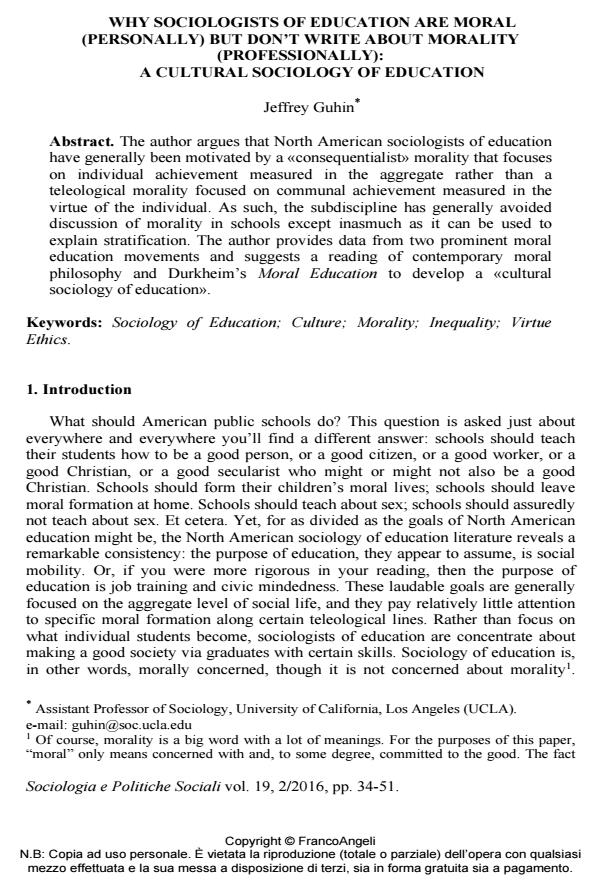Why sociologists of education are moral (personally) but don’t write about morality (professionally): a cultural sociology of education
Journal title SOCIOLOGIA E POLITICHE SOCIALI
Author/s Jeffrey Guhin
Publishing Year 2016 Issue 2016/2
Language English Pages 18 P. 34-51 File size 222 KB
DOI 10.3280/SP2016-002003
DOI is like a bar code for intellectual property: to have more infomation
click here
Below, you can see the article first page
If you want to buy this article in PDF format, you can do it, following the instructions to buy download credits

FrancoAngeli is member of Publishers International Linking Association, Inc (PILA), a not-for-profit association which run the CrossRef service enabling links to and from online scholarly content.
The author argues that North American sociologists of education have generally been motivated by a «consequentialist» morality that focuses on individual achievement measured in the aggregate rather than a teleological morality focused on communal achievement measured in the virtue of the individual. As such, the subdiscipline has generally avoided discussion of morality in schools except inasmuch as it can be used to explain stratification. The author provides data from two prominent moral education movements and suggests a reading of contemporary moral philosophy and Durkheim’s Moral Education to develop a «cultural sociology of education».
Keywords: Sociology of Education; Culture; Morality; Inequality; Virtue Ethics.
- What Makes a Quality College? Reexamining the Equalizing Potential of Higher Education in the United States Christina Ciocca Eller, in American Journal of Sociology /2023 pp.637
DOI: 10.1086/727891 - Dramatic Intellectuals Celso M. Villegas, pp.283 (ISBN:978-3-031-89908-9)
- Academic Orientation as a Function of Moral Fit: The Role of Individualizing Morality Kerby Goff, Eric Silver, Inga Dora Sigfusdottir, in Sociology of Education /2022 pp.153
DOI: 10.1177/00380407211072428 - Handbook of Classical Sociological Theory Jeffrey Guhin, pp.381 (ISBN:978-3-030-78204-7)
Jeffrey Guhin, Why sociologists of education are moral (personally) but don’t write about morality (professionally): a cultural sociology of education in "SOCIOLOGIA E POLITICHE SOCIALI" 2/2016, pp 34-51, DOI: 10.3280/SP2016-002003